
Main Page
Alphabetical Menu
Chronological Menu
|
The Art of Self-Defense 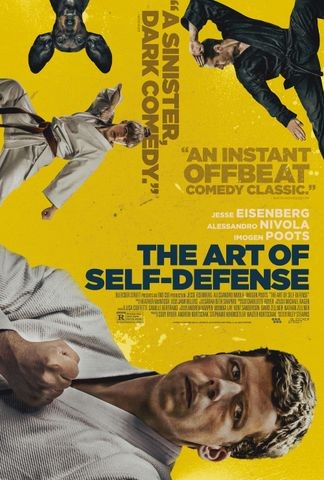 Casey (Jesse Eisenberg), a shy, insecure accountant, gets mugged and beaten up by masked men on a motorcycle. He decides to learn self-defense by joins a nighttime karate class at a local dojo where her meets its owner, Sensei (Alessandro Nivola), and a brown belt, Anna (Imogen Poots). The Art of Self-Defense can best be described as The Karate Kid on acid. It begins as a droll comedy in the same vein as Office Space and gradually becomes increasingly dark and unpredictable once Casey takes karate classes. Just when you think you know where the screenplay by writer/director Riley Stearns is headed toward, it surprises you with some bold twists along with provocative social commentary. Stearns finds just the right balance of tone that blends dark, off-kilter humor with drama and even some thrilling moments. The dialogue often pops with razor-sharp wit, but beneath its surface there's plenty of anger, sadness and frustration. The same can be said about Casey is more than meets the eye. He's an underdog who's not always likable based on the boundaries that he crosses throughout the film, but he's worth rooting for and caring about, especially because of the way that he had been emotionally and physically abused. It's somewhat inspiring to watch him become more assertive and confident. The third act does go a bit over the top without becoming silly and inane. Plausibility isn't one of the film's strong points, but it doesn't have to be. There's enough character development and depth to ground the film in just enough realism so that you're immersed in the life of Casey. Everything that Casey goes though can be seen as a metaphor or a microcosm that speak to larger themes ranging from toxic masculinity to self esteem to power and even, briefly, gun control. Stearns should be commended for not being too preachy regarding any of those topics. The cause of a film finding it's right tone isn't just it's screenplay, after all, but also its casting. Jesse Eisenberg is very well cast as the lead because he knows how to give a deadpan performance that shows the many layers of emotions lurking beneath Casey's surface. He may seem fragile on the outside, but he has inner strength that Sensei helps to bring to the surface in more ways than one. Likewise, Alessandro Nivola gives a solid performance as the smarmy Sensei. Despite him being strong on the outside, he's actually fragile on the inside. Stearns doesn't get to the root of what makes him such toxic human being or what makes Casey so insecure to begin with, so there's some room for interpretation there. Is society and pop culture to blame for that or perhaps it has something to do with how they were raised during their childhood. Either way, kudos for Stearns for not being afraid to shed light on the dark side of humanity. At a running time of 1 hour and 44 minutes, The Art of Self-Defense is wickedly funny, provocative and refreshingly subversive. It's destined to join Office Space, American Psycho and Heathers as an American cult classic.
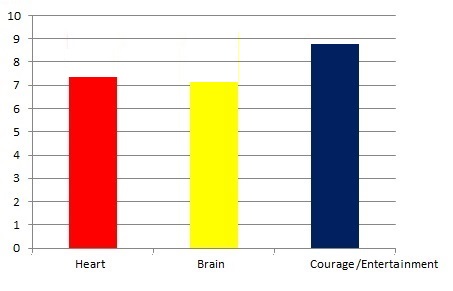 The Farewell 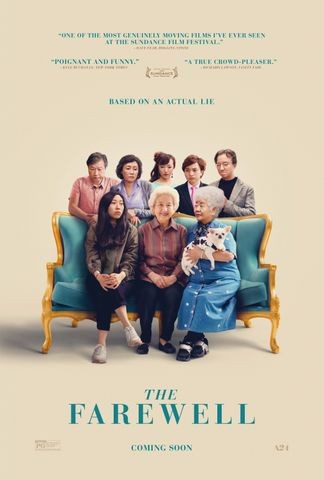 Billi (Awkwafina), a Chinese-American woman living in New York, travels to China to visit her grandmother, Nai Nai (Shuzhen Zhao), who's been recently diagnosed with terminal cancer. Nai Nai's sister (Lu Hong) and Billi's parents, Haiyan (Tzi Ma) and Jian (Diana Lin), decide not to tell Nai Nai about her diagnosis. Instead, they stage a fake wedding with her grandson, Haohao (Han Chen), and Aiko (Aoi Mizuhara), to gather the family to bid her farewell and to let her live her remaining days in peace. The Farewell could have easily turned into a sitcom, disease-of-the-week movie or a soap opera, but its sensitive screenplay by writer/director Lulu Wang refrains from veering into either direction. Wang has a wonderful command of how human beings interact with nuances, subtleties, understatements and wit intact. She deftly blends drama and comedy in a way that feels organic. The humor ranges from awkward to offbeat and dry without resorting to the lowest common denominator. There are no viagra jokes or fart jokes. This is a movie for adults. Each character feels like a fully-fleshed, living, breathing human being, especially Billi who faces a morally ambiguous dilemma when it comes to playing along with her family's lie to her grandma. Should she or should she not tell the harsh truth to Nai Nai? That's the question that Billi ponders and, if you're a compassionate, thoughtful human being, you most likely will be pondering that very same question yourself as well throughout the course of the film. It's that particular question, though, that allows for you to relate to Billi even if you and her are not from the same culture. Happiness, family loyalty, love and kindness are, after all, universal themes, but they're also very complex and, in some cases, even complicated. Awkwafina's genuinely heartfelt performance, though, ultimately opens the window into Billi's heart, mind and soul. She deserves to be nominated for Best Actress. Hopefully she'll continue to choose complex, challenging roles because she's a very talented actress. Good roles usually beget more good roles, so there's hope thanks to The Farewell. The Farewell doesn't judge any of its characters, and there's no villain to be found in sight. The villain is, rather, a silent, invisible one: Nai Nai's cancer. This isn't a film that's really about cancer, though, and it avoids becoming schmaltzy, maudlin and melodramatic. It's fundamentally about a family who come together to show their support and love for one another during a time of crisis. It's funny, melancholic, warm, sweet and poignant all at the same time. In other words, it's like life itself. Wang also includes some symbolism in the form of a bird, and doesn't hit you over the head with symbolism either. You might not grasp the meaning of the bird right away, but it makes a lot more sense in hindsight by the time the end credits roll. More importantly, though, Wang keeps the film focused on the dynamics of the relationship between Billi and her family while subverting your preconceived notions based on Hollywood conventions. For example, Nai Nai's handsome single doctor (Jim Liu) introduces himself to Billi, you'd expect them to have a romance with each other, but, alas, they don't. In a Hollywood film, the doctor would sweep Billi off her feet and they'd live happily ever after. The Farewell remains a truly engrossing, refreshingly un-Hollywood film from start to finish. It's as quietly powerful as Ordinary People and deserves to become a sleeper hit. It succeeds in every aspect that Crazy Rich Asians failed at.
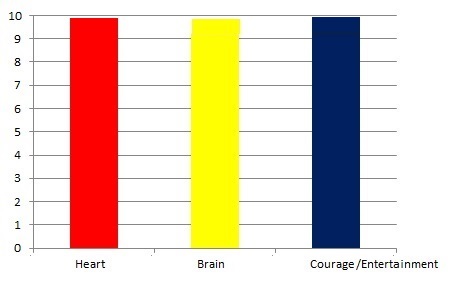 Lying and Stealing 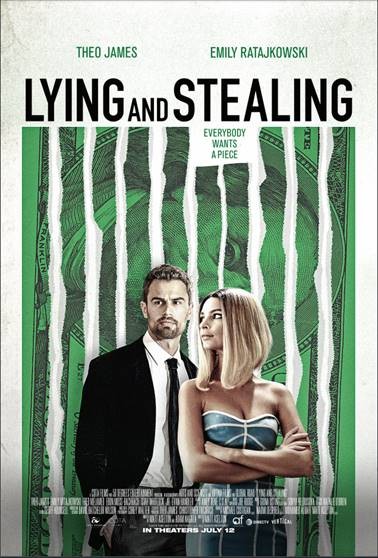 Ivan (Theo James), an art thief, plans one last heist to pay off the debts of his deceased father, also an art thief, to a smarmy crime boss Dimitri (Fred Melamed). He teams up with an actress Elyse (Emily Ratajkowski) to pull of the heist. Meanwhile, an FBI agent (Isiah Whitlock Jr.) investigates and tries to the thieves down. Lying and Stealing is a sexy and stylish crime caper with a sporadically witty screenplay by writer/director Matt Aselton and co-writer Adam Nagata. The plot has nothing new or surprising per se, but the charisma of its lead actor, Theo James, and his chemistry with Emily Ratajkowski keeps the film afloat. When Ivan and Elyse first meet, they banter and quip with each other. There are more moments of witty banter and quips spread throughout the film, but not nearly enough to add palpable pizzazz. The heist scenes themselves are somewhat engaging at least. Fred Melamed is very well-cast as the villain although there's nothing to make Dimitri truly memorable villain or come to life as a complex human being. He's pretty much one-note. Ivan and Elyse also come across as cardboard characters even though Ivan does have a few interesting details about his life, i.e. that he went to art school, so he actually appreciates the artworks that he steals. Also, he has a bipolar brother (Ebon Moss-Bachrach), but this is not the kind of film that fleshes out its characters and relationships enough for you to be emotionally invested in them. It's just trying to move the plot forward while sacrificing character development, nuance and substance. 2 Days in the Valley is a better example of a sexy and stylish crime thriller with much better-written characters and a more clever screenplay that blends comedy, action, drama and romance more deftly. Of course, there's also The Thomas Crown Affair and other classic capers, but Lying and Stealing pales by comparison. It indeed does have its share of action and comedy, but those scenes are nothing to write home about except for the initial meeting with Ivan and Elyse. The production values ranging from the set design to the lighting and camerawork look great and make the film very cinematic, and the pace moves briskly. However, it's ultimately just as shallow, slight and forgettable as Hollywood films made for 10 times the budget. At least it's mildly diverting and harmless with an ideal running time of 1 hour and 40 minutes.
 Rojo 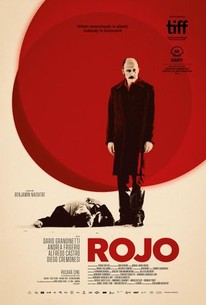
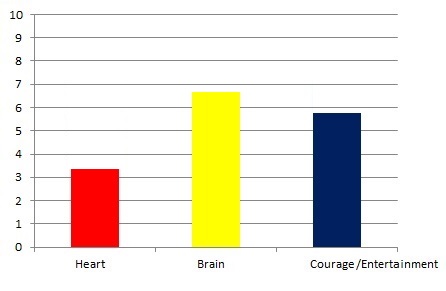 Stuber 
 Summer Night  A group of friends come together at a local small town bar where a band plays. Each of them has their own relationship problems to deal with including Jameson (Ellar Coltrane) who's on a first date with Harmony (Victoria Justice) but has yet to get over his ex-girlfriend, Corin (Elena Kampouris). His friend, Seth (Ian Nelson), has to deal with the announcement that his girlfriend, Mel (Analeigh Tipton), is pregnant. Rabbit (Bill Milner) crushes on Lexi (Lana Condor); Taylor (Callan McAuliffe), who plays a band, flirts with Dana (Ella Hunt) while she tends to his wounds after he got mugged. Summer Night suffers from an ailment that plagues too many films these days: lethargy. That ailment is in spite of the fact that the screenplay by Jordan Jolliff has many characters who go through many different innate struggles that anyone who's ever been a teenager can relate to. The performance are decent, although nothing exceptional, and the same can be said about the cinematography and music. There are simple too many characters and subplots which makes the film feel concurrently overstuffed and undercooked. Jolliff fails to develop any of the characters enough to allow them to seem like human beings that you truly care about. Perhaps if there were some windows into the characters' heart, mind and soul or more focus on just a few characters, it would have been a much more engrossing drama rather than one that's anemic, tedious and meandering. Seeing Ellar Coltrane in a coming-of-age movie is the equivalent of seeing Bud Cort in a coming-of-age movie after Harold and Maude. It makes it impossible to avoid comparing Summer Night to a far superior coming-of-age movie starring Coltrane as well, Boyhood, which is more poignant, haunting, bold and profound. Summer Night has nothing to say that's particularly insightful nor does it take any risks like Boyhood does. At least it doesn't have any bad laughs or clunky exposition, but it's so dull that it quickly fades from memory. The running time of 98 minutes feels more like 2 hours.
 The Sweet Requiem  Dolkar (Tenzin Dolker), a 26-year-old Tibetan refugee, lives in New Dehli where she works as a beautician. She leads a quiet life living with two roommates and befriending Dorjee (Shavo Dorjee), a human rights activist. After she meets a much older refugee, Gompo (Jampa Kalsang), she realizes that he just so happens to be the guide that abandoned her and her fellow refugees when she trekked through the treaturous terrain of the Himalayas while fleeing Tibet. The Sweet Requiem is a misnomer or an ironic title because there's nothing remotely sweet about Dolkar's recollections about her past. It's very dark, tragic and even a bit terrifying. Director Ritu Sarin and co-writer/director Tenzing Sonam deal with a very compelling premise that could've been thrilling, suspenseful and offered an intriguing psychological character study, but the dull screenplay, which tells the story achronologically, fails to land any of those beats most of the time. The film's heartfelt moments come more from Tenzin Dolker's performance than from the screenplay. To be fair, it's tricky to weaving a story with many flashbacks because flashbacks can take away from a film's momentum unless they're woven in organically and not over-used. The filmmakers rely too much on flashbacks which often don't add new information for the audience and make the film feel disjointed and a bit cold. In other words, its style gets in the way of its substance. Dunkirk suffered from that same ailment, but to a much stronger degree because it jumped around even more from character to character at different points in time. The scenery of the snowy mountains look great, though, but that's not nearly enough to compensate for the screenplay's shortcomings. Unfortunately, Sarin and Sonam don't include enough of a window into the heart, mind and soul of the protagonist, Dolkar. She's an interesting character with a lot of different emotions going on beneath the surface which rise to the surface throughout the film, and, like any human being, it's a daunting task to try to navigate through those emotions, especially without a therapist. There aren't enough scenes where you can get truly get inside Dolkar's mind. Perhaps narration could've helped or a more profound screenplay to bring Dolkar to life. At a running time of 91 minutes, which feels more like 2 hours, The Sweet Requiem is well-acted, but mostly disjointed and insipid.
 Sword of Trust 
 Trespassers 
 Main Page Alphabetical Menu Chronological Menu ______________________________________________________ |
The NYC Movie Guru
themovieguru101@yahoo.com
Privacy Policy